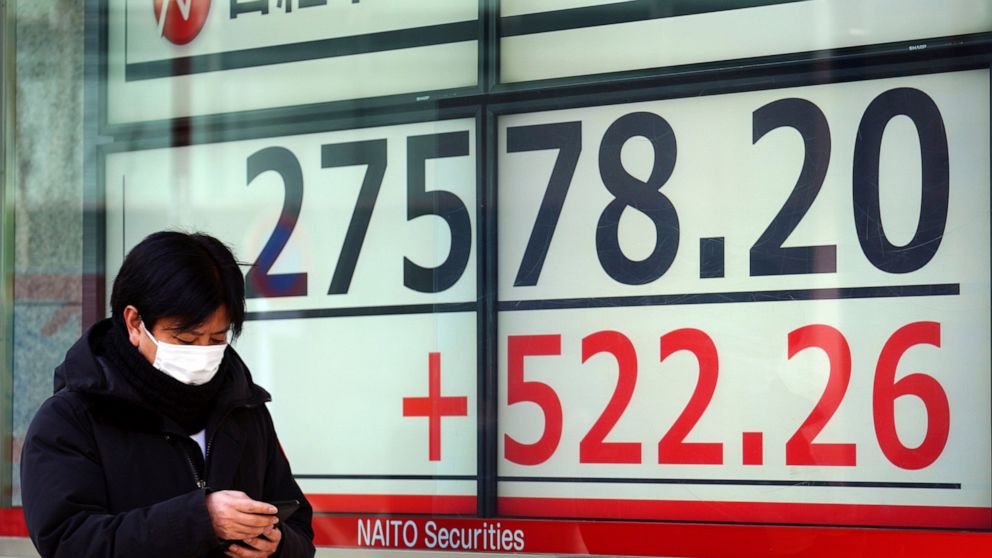Asian shares track Wall St rally on hopes for stimulus
Shares rose in Asia on Thursday after Wall Street rallied on expectations of more stimulus for the economy, despite chaotic scenes in Washington when Trump supporters stormed the U.S. Capitol.
Congress reconvened following the disruptions to the process for recognizing the outcome of the U.S. presidential election and U.S. futures were higher, with the contract for the S&P 500 up 0.8%. The future for the Dow industrials gained 0.6%.
Investors expect that Democratic control of both houses of Congress, after Democrats won two runoff senatorial elections in Georgia, has raised the potential for increased spending on infrastructure and more aggressive action to fight the pandemic under President-elect Joe Biden’s administration.
With pandemic restrictions being reinstated in many places as coronavirus caseloads rise amid faltering rollouts of COVID-19 vaccines, economists and investors have been hoping for more economic aid for Americans and businesses. A strong U.S. economy is needed to help drive a global recovery from the worst downturn in decades.
“What will matter most this year is the vaccination rollout and the ability to achieve herd immunity and more government spending. On the first point, President-elect Joe Biden is likely to aggressively accelerate the rollout from Jan. 20, which is positive for risk,” Stephen Innes of Axi said in a commentary.
The Nikkei 225 index in Tokyo gained 1.6% to 27,490.13. South Korea’s Kospi jumped 2.1% to 3,031.68 and the S&P/ASX 200 in Australia advanced 1.6% to 6,712.00. India’s Sensex rose 0.3% and shares in most other markets were higher.
Hong Kong’s Hang Seng index slipped 0.2% to 27,648.36 a day after dozens of pro-democracy figures were arrested under a national security law imposed by Beijing.
Shares in Hong Kong also were pulled lower after the New York Stock Exchange reversed an earlier decision not to comply with an order from the White House to delist three big Chinese telecoms companies. The companies are heavyweights in the Hang Seng.
China Telecom Hong Kong-traded shares dropped 8.9%, China Mobile’s shares sank 7.3% and China Unicom plunged 10.6%.
Shares in those companies and Internet companies affected by an expanded ban on transactions with some Chinese companies’ apps fell sharply “because of the actions of Donald Trump, trying to hurt China,” said Francis Lun, chief executive officer for Geo Securities in Hong Kong.
“Saner heads, people with better reasoning, hope that when Biden becomes president he will try to correct the mistakes that Donald Trump has done in damaging the U.S.-China relationship,” Lun said.
Overnight, the S&P 500 rose 0.6% to 3,748.14. The Dow gained 1.4%, to 30,829.40, a record high. Investors piled into stocks of smaller companies, banks and other businesses that would be winners if Democrats push through more economic support for the economy.
The Russell 2000 index of small-cap stocks surged 4%, to 2,057.92, a record high. Another round of stimulus for the economy could benefit smaller companies in particular because they tend to have smaller financial cushions to survive long-term downturns.
The rally lost some momentum Wednesday afternoon after the U.S. Capitol building went into lockdown as supporters of President Donald Trump broke through barricades and entered the building following clashes with police. Both houses of Congress abruptly went into recess, interrupting debate over the Electoral College vote that gave Joe Biden the presidency. Earlier, Trump riled up the crowd with baseless claims of election fraud.
Traders largely chose to look past the unrest and ahead to later this year, when they expect the prospects for the economy to brighten, analysts said.
The Nasdaq composite, which is full of tech stocks, shed early gains as investors shifted from the winners of the stay-at-home economy of the pandemic toward companies whose profits would benefit most from a healthier economy. The index fell 0.6% to 12,740.79.
A much worse than expected jobs report on Wednesday underscored how fragile the U.S. economy is because of the worsening pandemic. Payroll processor ADP said private employers cut 123,000 more jobs last month than they added, the weakest such report since April. The Labor Department’s more comprehensive report on jobs growth is due on Friday.
Big spending plans for the economy could trigger not only stronger growth for the economy in the future but also heavier borrowing by the U.S. government and maybe even inflation. Those factors helped push up Treasury yields, and the yield on the 10-year Treasury ticket up to 1.05% from 1.04% late Wednesday, having surpassed 1% for the first time since March.
Democratic control of Washington could also lead to higher tax rates for businesses, which would crimp profits and add downward pressure on stocks broadly. But analysts say that given how slim the Democratic majority may be scope for major change is limited. The party will have a 50-50 split in the Senate with Democratic Vice President-elect Kamala Harris providing a tie-breaking vote.
In other trading, U.S. benchmark crude oil gained 50 cents to $51.13 per barrel in electronic trading on the New York Mercantile Exchange. It rose 70 cents to $50.63 per barrel on Wednesday.
Brent crude gained 44 cents to $54.74 per barrel.
The U.S. dollar rose to 103.32 Japanese yen from 103.01 yen on Wednesday. The euro weakened to $1.2314 from $1.2326.
———
Associated Press reporter Alice Fung contributed.
![]()


